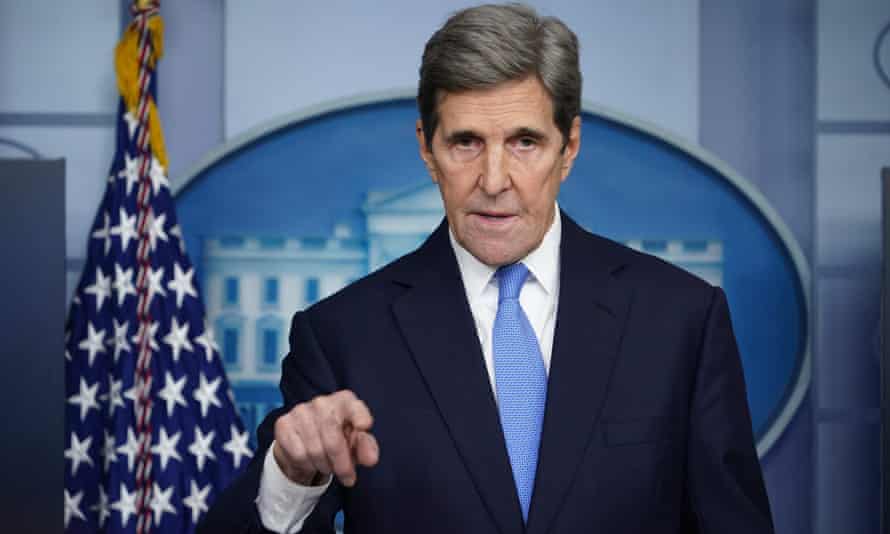Extract from The Guardian
John Kerry’s comments, including a call for a faster exit from coal power, add to pressure on the Coalition to do more

Last modified on Wed 24 Feb 2021 03.32 AEDT
Joe Biden’s climate envoy, John Kerry, has publicly acknowledged “differences” between the United States and Australia in tackling the climate crisis while calling for a faster exit from coal-fired power.
Kerry’s comments highlighted the increased pressure on Australia to commit to do more before this year’s Glasgow climate conference even though the Morrison government maintains it is “playing its part”.
With the Coalition currently wrestling with internal divisions on whether to formally commit to net zero by 2050, a spokesperson for the minister for emissions reduction, Angus Taylor, said the US agreed with Australia on the need for “practical solutions”.
Taylor’s spokesperson declined to specifically address Kerry’s view that “coal has got to phase down faster”.
Kerry, the former US secretary of state who is now leading Biden’s effort to drive urgent action on the climate crisis, has echoed other global leaders in describing the 2020s as a “make or break” decade in which all countries needed to cut emissions more quickly.
In an event last weekend marking his country’s return to the Paris agreement, Kerry said the US needed to regain credibility by adopting a strong new target for 2030, due to be announced in April. He said he would work “in a collegiate manner with other countries around the world”, before specifically mentioning Australia and the part it played at a deadlocked 2019 climate conference.
“For instance, I’ve talked to Australia – we had a very good conversation,” Kerry said in an extended conversation with former US vice-president Al Gore posted online over the weekend.
“Australia has had some differences with us, we’ve not been able to get on the same page completely. That was one of the problems in Madrid as you recall, together with Brazil.”
That was a reference to COP25 in Madrid in December 2019, when parties to the Paris agreement were aiming to agree on the rulebook for implementing it. Australia was accused by some countries of blocking progress when it refused to drop a plan to use controversial carbon credits from the unrelated Kyoto Protocol to meet its 2030 Paris target.
Brazil was also accused of preventing agreement through its insistence that it be allowed a different type of Kyoto-era credits that led to accusations it was “double-counting” emissions cuts.
Laurence Tubiana, a former French environment minister and architect of the Paris accord, at the time described using carryover credits as “cheating” and said Australia seemed to be “willing in a way to destroy the whole system”.
Over recent months, Australia has attempted to pivot on climate policy, saying it no longer expects to need to use the credits to reach its 2030 emissions pledge.
Scott Morrison has also argued he hopes to achieve net zero as soon as possible, preferably by 2050, but has not explicitly committed to it. The suggestion he might triggered outrage from some from Nationals MPs but an increasing number of Australia’s trading partners have embraced the goal.
When approached for a response to Kerry’s comments, Taylor’s spokesperson said the pair had “a friendly and positive conversation” in late January.
The spokesperson said Australia welcomed the Biden administration’s return to the Paris agreement “and the increasing global focus on the practical solutions that will make global net zero achievable”.
Taylor’s spokesperson said it aligned with Australia’s technology investment roadmap, which had been discussed between Biden and Morrison.
“Australia is playing its part in the global response to climate change by meeting and beating our international targets,” Taylor’s spokesperson said. “When we make commitments, we meet them. Action and outcomes are what matter, and our track record is one that all Australians can be proud of.”
Australia has been criticised for setting targets that ignored what scientists say is necessary. Its first target under the Kyoto Protocol allowed an 8% increase in emissions, and its second target was a 5% cut.
Before joining the Paris agreement, the then Abbott government was advised by the Climate Change Authority that it should set a 2030 target equivalent to at least a 45% and up to a 65% cut compared with 2005 emissions levels. It instead opted for between 26% and 28%.
Official projections released in December suggested the Morrison government was not on track to meet this goal under existing measurable policies. The former finance minister, Mathias Cormann, has been forced to defend the government’s climate record during his current campaign to lead the OECD.
In the weekend event, Kerry outlined the importance of increasing ambition on climate action “on a global basis” for “our children’s sake and our grandkids’ sake”.
He noted the US, China, the European Union and India together accounted for more than 60% of emissions, and none of those nations was doing enough, but that also applied to “many others at lower levels of emission”.
The Glasgow climate conference in November will be preceded by Biden hosting a leaders’ climate meeting on 22 April. Both aim to significantly increase international resolve to address the problem.
Kerry said the US summit would focus on getting the 17 nations that produce the vast majority of emissions, including Australia, to commit to reaching net zero by 2050 and setting a roadmap this decade that would explain how they would accelerate action to keep alive the possibility of limiting global heating to 1.5C above pre-industrial levels.
The US secretary of state, Antony Blinken, discussed climate policy with his Australian, Japanese and Indian counterparts in last week’s Quad talks.
Biden said late last week countries could “no longer delay or do the bare minimum to address climate change” because it was “a global, existential crisis, and we’ll all suffer the consequences if we fail”.
No comments:
Post a Comment